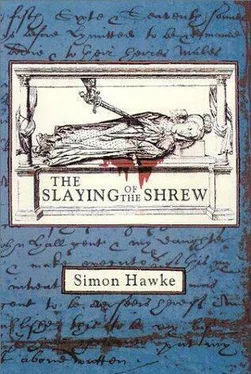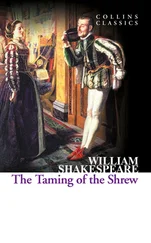Simon Hawke - The Slaying Of The Shrew
Здесь есть возможность читать онлайн «Simon Hawke - The Slaying Of The Shrew» весь текст электронной книги совершенно бесплатно (целиком полную версию без сокращений). В некоторых случаях можно слушать аудио, скачать через торрент в формате fb2 и присутствует краткое содержание. Жанр: Исторический детектив, на английском языке. Описание произведения, (предисловие) а так же отзывы посетителей доступны на портале библиотеки ЛибКат.
- Название:The Slaying Of The Shrew
- Автор:
- Жанр:
- Год:неизвестен
- ISBN:нет данных
- Рейтинг книги:5 / 5. Голосов: 1
-
Избранное:Добавить в избранное
- Отзывы:
-
Ваша оценка:
- 100
- 1
- 2
- 3
- 4
- 5
The Slaying Of The Shrew: краткое содержание, описание и аннотация
Предлагаем к чтению аннотацию, описание, краткое содержание или предисловие (зависит от того, что написал сам автор книги «The Slaying Of The Shrew»). Если вы не нашли необходимую информацию о книге — напишите в комментариях, мы постараемся отыскать её.
The Slaying Of The Shrew — читать онлайн бесплатно полную книгу (весь текст) целиком
Ниже представлен текст книги, разбитый по страницам. Система сохранения места последней прочитанной страницы, позволяет с удобством читать онлайн бесплатно книгу «The Slaying Of The Shrew», без необходимости каждый раз заново искать на чём Вы остановились. Поставьте закладку, и сможете в любой момент перейти на страницу, на которой закончили чтение.
Интервал:
Закладка:
“ Elizabeth,” said Smythe, “are you all right?”
She was staring at the body with a strange expression on her face, a look somewhere between alarm and desolation. “ ‘Tis the third time now that I have seen somebody slain. First Anthony Gresham, struck in the back by a thrown knife before my very eyes. Then within the span of but a few months, Catherine is stabbed to death, and now poor Daniel Holland is run through with a sword.” She took a deep breath and let it out in a heavy sigh. “I gaze down on his body and I feel sadness and regret that his young life should have been snuffed out so suddenly and cruelly, and yet… I do not scream with terror. I am not horrified into near insensibility by the sight. I do not feel my gorge rising at the sight, nor do tears come coursing down my cheeks. I wonder what has become of me that I can look so calmly upon death?”
“Familiarity doth breed contempt, milady,” Worley replied. “With repeated exposure, one can grow accustomed to almost anything. Else one would go mad. ‘Tis a lesson learned by each and every soldier on the battlefield, and each and every sailor on the sea. I am saddened that a young lady like yourself should learn it, also. Would that it were not so.” He turned to Smythe and Shakespeare. “You two should take up Holland ’s body and bring it to the house. When you are asked what happened, tell the truth… just take care that you do not tell it all. Say no more than what you know and what you yourselves have witnessed. Say nothing of Holland ’s tryst with Blanche. You were out walking in the garden and you heard a cry. You responded, and you found him slain. Say nothing of my presence. ‘Twould be best were I not seen. Remember… I am not here.”
“But how shall we find you if we need you, milord?” asked Smythe.
“Never fear, I shall find you. Now go on. Take Holland back. Let us stir up a hornet’s nest and watch what happens next.”
As Shakespeare said when they returned to the house, “The specter of death appears to have brought new life to the festivities.” Indeed, thought Smythe, it was strangely and unsettlingly all too true. The house was ablaze with lights when they returned, and even the fairgrounds were weirdly illuminated with flickering torchlight and campfires. Having earlier closed up their stalls and colorful pavil-lions, the merchants had opened them up once again to take advantage of the situation as the guests stayed up and wandered through the house and fairgrounds. It seemed that no one slept, as they were all eager to hear or else impart the latest bit of gossip.
Catherine’s dramatic resurrection and murder already had everyone abuzz, and anyone who had retired for the night had been awakened by the uproar of people running through the halls and calling out the news or else banging upon doors to awaken their friends. When Shakespeare and Smythe, accompanied by Elizabeth, returned to the house, bearing between them the limp body of Daniel Holland, the news exploded through the estate like a petard.
The stricken Sir Roger was desolated by the news of his son’s death, but his grief was mixed with righteous fury as he announced to one and all that he would pay a thousand crowns to whoever brought his son’s murderer before him. Not to be outdone, Godfrey Middleton immediately doubled the amount.
“This outrage against justice and all humanity shall not be tolerated!” he cried out to the assembled guests. “We shall never submit to it! We shall not suffer damned, bloodthirsty assassins to walk amongst us unmolested! I hereby swear before Almighty God that our children’s foul murders shall be avenged!”
“Oh, damn, where did I leave my pen?” muttered Shakespeare, as he listened raptly to Middleton’s address. “This is great stuff!”
“Really, Will!” said Elizabeth, taken aback by his response.
“Forget it, Elizabeth,” Smythe said to her, shaking his head.
“ ‘Tis hopeless. He cannot help himself. He is a poet, and to a poet, all the world’s a stage and all the people in it merely players.”
Shakespeare cocked an eyebrow at him, but said nothing.
They were questioned at length by everyone, it seemed, until both Smythe and Shakespeare had grown nearly hoarse from telling the story over and over again. To escape all the attention, Elizabeth finally retired to her room to pack her things. Middleton had said nothing about rescinding his order for her departure, and though she was not eager to leave now that things had reached a fever pitch of excitement, she did not seem to have much choice.
“What a perverse creature I have become,” she said to Smythe, before she went back upstairs. “All sensibility and logic dictates that I should make all haste to leave this place, and yet, I find myself longing to remain and see how it all turns out. I cannot reconcile my feelings. I am both repelled and fascinated.”
“I know just how you feel,” Smythe told her. “I felt much the same when first I set foot on London Bridge and beheld the severed heads of criminals set upon the spikes there. I had never seen anything like that at home, in my small village, and when I first beheld the birds feasting on the rotting flesh of those gruesome, severed heads, I was nearly sickened by the sight. I was appalled by it, and yet, I could not look away. Now, when I pass by them on the bridge or by the law courts, I scarcely even notice them.”
“Have we become so callous then,” she asked, “that the sight of violent death touches us so little, or even not at all?”
“It does, indeed, touch us,” Shakespeare said, “else we would not be speaking of it so. ‘Tis when we stop speaking of it that we must feel concern about our very souls. Ask yourself, Tuck, about those very heads of which you speak. Is it truly that you scarcely notice them because you do not find them remarkable in any way at all, or because despite having become accustomed to their presence, you nevertheless prefer to look away and not dwell upon the sight? If we see a beggar on the street, scrofulous and ragged, do we gaze at him directly, with honest curiosity, or do we not look away? And if we look away, is it because we are not touched by his sad plight, or because we fear we may be touched too much? Those severed heads are not placed there on the spikes in order to inure us to the sight, but quite the opposite. They are put there to horrify, as an object lesson, intended to touch us with its violence.”
“And yet there are those who are not touched at all,” said Smythe.
“Aye,” said Shakespeare. “And ‘tis their heads that are placed upon the spikes to remind us of the consequences.”
“Well, I, for one, shall pray that whosoever murdered Catherine and Daniel shall suffer those selfsame consequences,” said Elizabeth. She looked around. “This celebration has become a festival of death and we are all specters at this wedding. ‘Tis meet that I should leave, lest I begin to enjoy myself too much.”
“Methinks the lady thinks too much,” said Shakespeare, as he watched her walk away. “ Twill make her life most cumbersome.”
“Hmm,” said Smythe. “And then again, some men have found life cumbersome because they thought too little.”
Shakespeare smiled a bit ruefully. “I do believe the lad has scored a touch. Methinks you like her more than just a little. You are a caring soul, Tuck. Take care you do not care too much.”
“We have had this conversation.”
“Indeed, we have. Point made and taken. Let us proceed then to another matter close at hand. Namely, our two remaining suspects. What shall we do about them, do you think?”
Smythe shook his head. “I am not sure. Sir William was not very clear in his instructions.”
“Well, he did say we should stir up a hornet’s nest,” said Shakespeare. “Yonder comes the Frenchman, making straight for us. Let us poke him just a bit and see how he responds.”
Читать дальшеИнтервал:
Закладка:
Похожие книги на «The Slaying Of The Shrew»
Представляем Вашему вниманию похожие книги на «The Slaying Of The Shrew» списком для выбора. Мы отобрали схожую по названию и смыслу литературу в надежде предоставить читателям больше вариантов отыскать новые, интересные, ещё непрочитанные произведения.
Обсуждение, отзывы о книге «The Slaying Of The Shrew» и просто собственные мнения читателей. Оставьте ваши комментарии, напишите, что Вы думаете о произведении, его смысле или главных героях. Укажите что конкретно понравилось, а что нет, и почему Вы так считаете.












